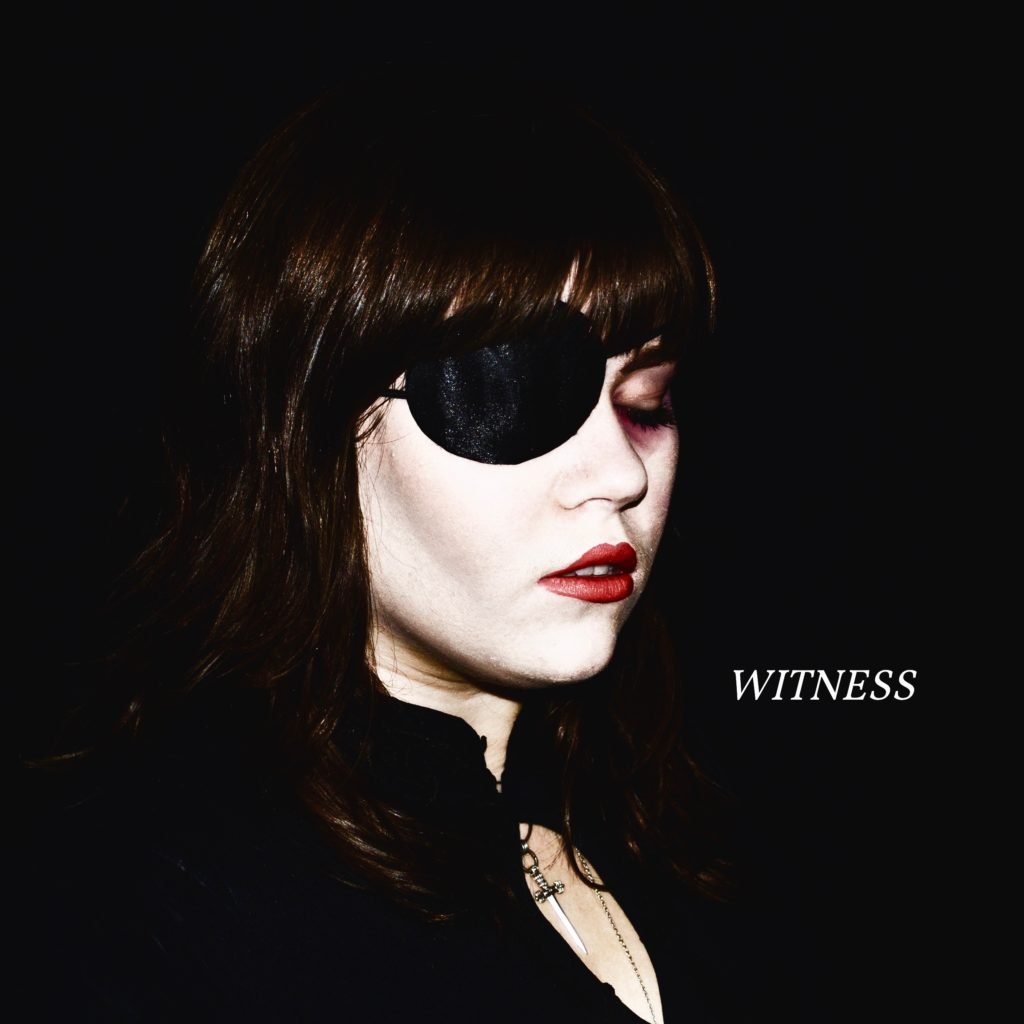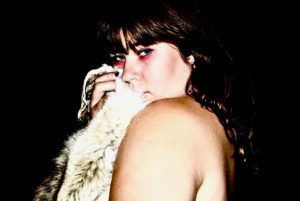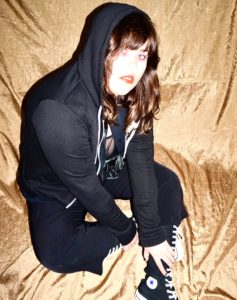
Truly great, meaningful and transformative art rarely comes from the lighter side of the emotional and psychological spectrum. Often it is though processing intense sadness, fear and especially pain that the world is gifted with brilliant paintings and sculpture, scintillating and paradigm-shifting literature or music that sears the soul and fills the heart of all who hear it.
Toronto singer/songwriter Little Coyote has used the trauma of enduring a highly toxic and exceptionally abusive relationship to craft her new single, Witness. It is a heartbreaking cry for help that targets the abuser, but also a plea for help from others who are in close proximity to the situation. It is irresistible in its emotional candour, and memorable for its incendiary vocal performance. But from such raw inspiration, ultimately, it is a song of redemption, of inner strength, and of the revitalizing power of the human spirit.
“When I wrote this song, it was when I was still kind of in the relationship, and I was writing it from a sympathetic point of view to both of us, which is strange. It’s not easy to get away from someone you think you love. The abusive behaviour hits you on many levels too, the levels of the kind of person who would do something like that. And it’s not so much what he did as how did all of that make me feel about myself. I think that someone us supposed to be loving you and protecting you and there for your, because you see them as that previously in your life, because they have treated you as someone who is worthy of being treated that way because everyone is. It makes you question that. ‘Is this the best that I deserve to be loved, and is it something that I have done, to make someone think that this is how I should be treated?’” said Little Coyote, aka Teagan Johnston, from her home in Toronto.
“And also, once you do start talking about it, it’s a whole other aspect to pull apart because then you feel like to everyone else you are just a victim, and that’s a really strange feeling too because it takes away the feeling of strength at the beginning, because you feel that’s just how people see you. And I think the ‘witness’ is anyone, I guess. It’s the romantic idea of having someone else there to say that’s what’s happening and it’s not okay, because there’s so many mind games and it’s such a confusing situation to be in when you’re in it. There’s a part of the lyric that asks, ‘do you think I wanted this,’ and I guess that’s directed at him, but also to anyone who would question it.”
Unlike many singer/songwriter solo artists who are more oriented to writing and performing on guitar, Johnston has always preferred the breadth of emotion one can derive from the piano, which she uses to stunning effect to create the atmosphere on Witness.
“It can sound very melancholy for sure, and I love that quality about it. And there is something so physical and friendly about a piano, I think. It’s like a friend I can turn to talk to. If you sit down at an upright or an acoustic piano, it’s like having someone to lean on almost, whereas with the guitar, you are holding it. The piano is like an altar, it’s something stable and solid for me,” she explained.
 Little Coyote is essentially Johnston’s nom de plume – the identity under which she writes, records and performs music, and came from a childhood nickname. She moved around a lot as a kid, which was difficult in the sense of being uprooted every so often and thus made it difficult to forge and maintain friendships. But it’s the period in which she learned to become reliant on her own voice, her own intellect and how to process emotions and experiences. Witness is her first release since her impactful and critically acclaimed debut album The Trouble With Teeth, which came out in 2017.
Little Coyote is essentially Johnston’s nom de plume – the identity under which she writes, records and performs music, and came from a childhood nickname. She moved around a lot as a kid, which was difficult in the sense of being uprooted every so often and thus made it difficult to forge and maintain friendships. But it’s the period in which she learned to become reliant on her own voice, her own intellect and how to process emotions and experiences. Witness is her first release since her impactful and critically acclaimed debut album The Trouble With Teeth, which came out in 2017.
“I have been playing piano and writing poetry since I was five and began bringing the two together more when I was about 14. I got serious about music when I was about 16. I did an EP when I was living out west under my own name, but I would say this portion of my career and this level of seriousness began probably since I was 19 and moved to Toronto and started going after it full on,” she said.
“Little Coyote was a nickname from when I was a kid. I was born in the Yukon; my mom and dad were driving to the hospital to have me when a little coyote ran in front of their car, so that became a bit of a pet name for me. So, when I was looking for a name to use as an artist, it just seemed right. My dad was a structural geologist, so he was doing mapping and stuff up there, and moved around a lot. We went to South Africa and then to Victoria B.C. which is where I mostly grew up. We also lived in Switzerland and Spain for a bit. I was this really depressed five year old when we moved to Victoria, and I am sure that’s when and why I started writing poetry.
“Moving around as a kid a lot has definitely had a huge impact on everything, not just my art, but the way I am as a person and the way I approach things and perceive things.”
This is obvious in Little Coyote’s music, especially with Witness. Both the song and the video are deeply moving, stark and blunt, very real, authentic and eminently powerful. Witness is a statement of resilience and empowerment, but also a compelling true life journey from a place of vulnerability and pain to one of renewal and reclamation of her spirit and the connection to her adopted city.
“It’s a really strange thing too, when suddenly you don’t feel safe anywhere anymore, and it’s hard to live in the city. So, I left for a bit because I couldn’t really deal. It’s strange to walk around somewhere that you used to feel happy and safe in, and suddenly feel nowhere is your home anymore, which is kind of what the video is trying to speak to. I have lived in Toronto for almost five years and I left last October when all of this was happening and went and recorded Witness and did a bunch of touring. I basically spent six months away from the city and I just came back in April. Since coming back it’s been really good, it’s been really positive but its definitely taken a lot of my own personal work, and a lot of good friends and family to feel comfortable again,” she said.
“I got a lot of therapy after that, which I am happy to speak of. Of course, to anyone out there reading this, always get help and always reach out. It’s pretty impossible to do it yourself. And the process of recovering from the relationship and from the abuse is very complex. It’s not like in the movies or TV shows. It’s not a simple story to tell people. The best kind of metaphor that is used pretty often is frogs. If you put a frog in a pot of boiling water, it would jump right out and would be fine. But if you put a frog in a pot of cool water and slowly brought it to a boil it would die, which is what an abusive relationship is like.
 “I write about what I know, and I write about stuff that’s personal to me. So, this relationship was what I wrote about and most of the songs on my new record are going to be about that, because that’s what I was going through. In putting it out, I don’t want to say that I didn’t have a choice, but it’s something that was kind of inevitable – it had to happen. And then because behind that motivation is the fact that it’s also really scary. Releasing this song and talking about the abuse and the relationship is not something I would necessarily want to do, but since I am doing it, I realize that I have to be honest about it, and have the narrative for other people to maybe relate to it, or take something from it. My motto in doing all of this is that it’s not about him at all. I have removed him from my mind in this narrative. It’s about something much bigger now.”
“I write about what I know, and I write about stuff that’s personal to me. So, this relationship was what I wrote about and most of the songs on my new record are going to be about that, because that’s what I was going through. In putting it out, I don’t want to say that I didn’t have a choice, but it’s something that was kind of inevitable – it had to happen. And then because behind that motivation is the fact that it’s also really scary. Releasing this song and talking about the abuse and the relationship is not something I would necessarily want to do, but since I am doing it, I realize that I have to be honest about it, and have the narrative for other people to maybe relate to it, or take something from it. My motto in doing all of this is that it’s not about him at all. I have removed him from my mind in this narrative. It’s about something much bigger now.”
The video for Witness sees Little Coyote walking the streets of Toronto at night, with her face shrouded in a hood. It is a truly powerful image, with that power compounded up the final scene, where the hood comes down to reveal Johnston’s face, defiant and steely-eyed … but wearing a Nick Fury-esque eye patch. It’s an image of one who has suffered wounds that have left their mark – but whose spirit is undaunted, whose sense of self has been resurrected and whose resolve is firm and unwavering.
“The video was my concept and I worked with a great Toronto director, Ryan Glover, who totally bought into my vision. To me the video is a completion of the story arc. In writing the song and especially doing the video, on a personal level, there was an amount of safety that I found in coming back to Toronto with putting this all on the table. It’s made me feel that, ‘well, there’s nothing left to hide. I am not hiding, and I am not going to shut up about whatever.’ So, I think that reclaiming who I am as an artist and who I am as a person and not letting the relationship define me, but what keeps me going is big for me for sure. The eye patch is kind of saying, ‘this is what it is, but I am not going anywhere,’” she explained.
Little Coyote is working on lining up some festival dates for this summer and will be performing June 8 at The Horseshoe Tavern opening for friend Skye Wallace, who is having a CD release party that night. Johnston also continues to work on new songs for a new album that she hopes to have wrapped up this summer, with a release date possibly in the fall or early winter.
For more information, visit https://www.littlecoyotemusic.com.
- Jim Barber is a veteran award-winning journalist and author based in Napanee, ON, who has been writing about music and musicians for a quarter of a century. Besides his journalistic endeavours, he now works as a communications and marketing specialist. Contact him at jimbarberwritingservices@gmail.com.
SHARE THIS POST:
